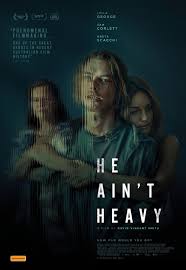
HE AIN'T HEAVY
Australia, 2024, 102 minutes, Colour.
Leila George, Sam Corlett, Greta Scacchi, Clarence Ryan, Alexandra Nell.
Directed by David Vincent Smith.
It is over 50 years since the group, The Hollies, sang “He ain’t heavy… He’s my brother!” (1969).
Which means that this is a film about a brother, a brother in difficulties, bearing a heavy load. In fact, the burden is addiction and consequent mental illness. Which also means that this is a very serious film, quite demanding on its audience, affecting the emotions but also the very serious challenge as to the best means to assist someone with a mental illness. how much reliance on doctors and psychologists? How much reliance on committing to institutions? How much reliance on medication? And any personal intervention to effect some kind of healing?
This film was made in Western Australia. The central character is a sister, Jade (Leila George). She is in her 30s, has a loving but sometimes strained relationship with her mother, Bev (Greta Scacchi). And the brother is her younger brother, Max (Sam Corlett) but dependence long since, a history of violent outbursts but with no memory of his actions, partly living on the streets. There are flashback memories of brother and sister when they were young, times when there was hope.
Jade elicits audience sympathy because, with her concern about her brother, she has not done anything much with her life, serving behind a bar, sometimes socialising with a friend, but preoccupied with Max. Audiences will be struck by the physical similarities between mother and daughter, so they will not be surprised to find that Leila George is, in fact, Greta Scacchi’s daughter.
The challenge of the film is watching Jade’s decision to put Max in a situation of cold turkey. She persuades him to come and help with clearing up their grandmother’s house, spikes his drink, putting him into a room where she hasset up a surveillance camera, locking the door (three locks) and the window covered by bars. Needless to say, what follows is quite harrowing for Max, for Jade, and also when her mother arrives and discovers what is happening, eager to let her son out, exhorting her daughter to get dressed up and go to a farewell party for her friend – which ends with Jade and violent outburst towards an insensitive partygoer who keeps going on and on about her brother.
Sam Corlett gives a very vivid and persuasive performance of somebody undergoing the throes of cold turkey, the physical consequences, the emotional consequences, the psychological consequences.
The director, David Vincent Smith, originally made a short film on this theme. He explained that the background was his experiences with his own brother.
- The title, the Hollies 1969 song,… He’s my brother?
- Audience response to stories of mental illness, addiction, treatment, impact on families, responsibilities, love?
- The setting in Western Australia, the suburbs, homes, the streets, medical centres? The musical score?
- Based on a true story, the director and the experience of his brother? The intensity, concern, empathy? Frustrations?
- The situation, the opening, Max at the door, ranting and raving, Jade approaching, entering the house, her mother inside, the neighbours complaining, the confrontation, Max taking the car and crashing it, disappearing?
- The title, Jade and her brother? Growing up, their experiences, the presence of their mother, caring for Max, taking jade for granted? The impact on the adult Max?
- Jade, age, serving in the bar, never having travelled, her friendship with Tegan, her prospects, sense of frustration? The relationship with her mother, loving, tensions? Her concern for Max, growing up, memories of the past, the strong bond with the brother?
- Max, his reputation, on the street, the drugs, the flat with his friends, watching television? Jade bringing him to the grandmother’s house to help with the moving? Her setting up the house, the surveillance? His drinking? Getting the room, locking him in, the bars, the three locks, her ability to look in through the bars, bring him food? The stress on her, tentative, the right thing or not?
- Max, the reaction, the drugs, the food, his cold, ranting and raving, swearing, the hole through the wall, covering it up, pretending to be unconscious, the attack on Jade? Her violence towards him? The days passing, the effect, his moods? Some happy memories?
- Jade and her mother, grandmother’s house, the going over to clear it up, Jade’s plan? Her mother coming over, her reaction to Max, locked up, her wanting him freed, her concern, the food, conversations, gradually accepting it? Urging Jade to go to Tegan’s party? Unlocking the door?
- Jade, unwilling to go to the party, her mother giving her the dress, at the party, the friendship with Tegan, talking with her, confidentiality, the young man talking about Max and his reputation, not taking any hints, punch Jade ing him? Her going home, the confrontation with her mother?
- The flashbacks, Max and his behaviour, taking him to the medical centre, having to wait hours because of the delay for mental care? The cumulative effect? And the scenes of bonding between brother and sister, the guitar, the music?
- The police, the contact, Max and the bashing, his remembering nothing, the photos of the victim? Jade, in the car, looking at the victim’s family?
- Resolution and no resolution? The temporary calming of Max, the police arriving, jade allowing him to be handcuffed, taking him away? His future? Jade and her mother? Jade and the possibilities of opening up her life?